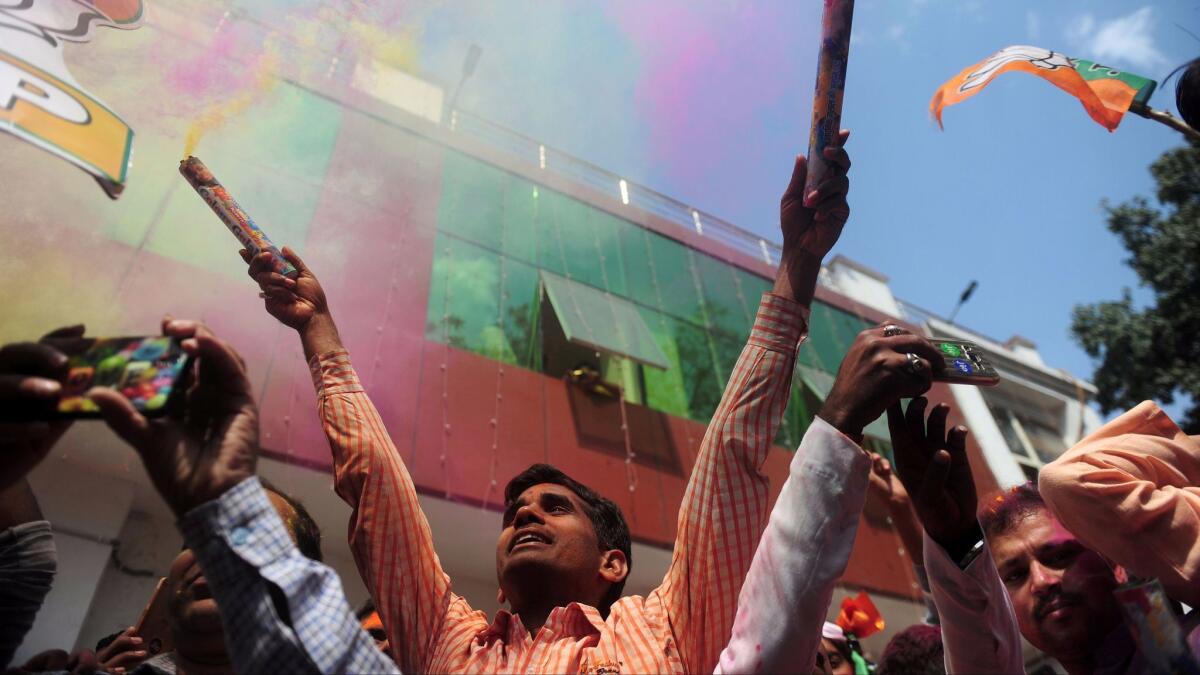India’s Narendra Modi leads his party to victory in a state with more than 200 million people

Reporting from Mumbai, India — In the biggest election in the world this year — in terms of population, at least — India’s governing Hindu nationalist party recorded a massive victory that underscored the widespread popularity of Prime Minister Narendra Modi.
Led by Modi’s vigorous campaigning, the Bharatiya Janata Party, or BJP, won 325 of 403 state assembly seats in the northern state of Uttar Pradesh, easily dethroning a powerful incumbent party and shrugging off the effects of the prime minister’s controversial decision to withdraw most of India’s cash from circulation in November.
The demonetization measure, which Modi said would reduce corruption in the form of undeclared assets and modernize India’s economy, had the greatest impact on daily wage earners, leading some experts to predict that the BJP would struggle among the state’s large lower middle class.
But Saturday’s results in Uttar Pradesh — home to more than 200 million people, more than all but five countries — suggested that the move was far more popular than analysts and political opponents had expected and sets Modi up well for national elections due in just over two years.
“People like leaders who take risks,” said Rajdeep Sardesai, a prominent television journalist. “The fact is Modi still enjoys credibility and trust from an average voter. If nearly three years into his term, he has won U.P. on his image, then Modi can look at 2019 with confidence.”
In other state assembly results announced Saturday, the BJP won a sizable majority in rural Uttarakhand state but fell short in the northern farming state of Punjab, which was won by the opposition Indian National Congress. No party won a majority in two smaller states, Goa and Manipur.
The results could help Modi’s party gain ground in the upper house of parliament, whose composition is dictated in part by state assemblies, and whose current members have stymied many of Modi’s economic reform proposals, saying they would hurt the poor.
The BJP controls 13 of India’s 29 state assemblies, but by far the biggest prize is Uttar Pradesh, where it had not held a majority since 1991.
In barely three years in power, Modi’s swaggering style and promises of economic change have made him a towering national leader in a country where politics often are dictated by caste and region.
In some of the remotest villages of Uttar Pradesh, where the demonetization policy was thought to have caused the most disruption, many voters said that even though they were struggling, they supported the move because it took on the dishonest rich.
Because of the large numbers of voters, balloting took place in several phases starting Feb. 11. Speaking before she cast her ballot last month in rural Amethi, a bastion of the rival congress, Shraddha Tiwari, a 20-year-old arts student, said Modi had gone after people who had stashed so-called black money in their homes.
“Modi is decisive,” she said. “Even if it had an adverse impact on some of us, it was important for the larger good of the country.”
The BJP won despite not declaring its candidate for chief minister, Uttar Pradesh’s top executive. Modi was the only name that mattered to many voters, who cited the positive changes he had brought to the western state of Gujarat in more than a decade as its leader.
Sachin Sharma, 22-year-old vendor in the remote village of Udwa, said he voted for the BJP because of his support for Modi — and because of images of Gujarat he had seen on WhatsApp, despite never having left his own state.
“The coordination between the state and [the central government in New Delhi] would be good,” Sharma said. “And we all know how well Modi has developed Gujarat.”
Critics said the BJP appealed to religious differences and accused Modi and his party members of making several questionable assertions while campaigning in Uttar Pradesh, which has a large Muslim minority.
At one rally, Modi attacked the incumbent Samajwadi Party by saying it did not allocate as much electricity for the Hindu holiday of Diwali as it did for a Muslim festival — which media reports later showed was false.
His party has been accused of promoting a pro-Hindu agenda at the expense of the roughly 20% of Indians who are Muslims, Christians or of other faiths.
One of the biggest challenges for Modi’s party in leading Uttar Pradesh will be to ensure Muslims don’t feel marginalized, said Sardesai, who pointed out that of all the BJP’s incoming assembly members in the state, not one is Muslim.
Special correspondent Parth M.N. reported from Mumbai, India, and Times staff writer Bengali from Yangon, Myanmar.
Follow @SBengali on Twitter for more news from South Asia
MORE WORLD NEWS
Twin blasts kill 40, injure more than 100 near religious sites in Syria’s capital
President’s ouster caps months of discontent in South Korea, but will it change anything?
Bone by bone, Iraqis unearth a mass grave: ‘We will be out there digging until no one is left’
Number of immigrants caught at Mexican border plunges 40% under Trump
More to Read
Sign up for Essential California
The most important California stories and recommendations in your inbox every morning.
You may occasionally receive promotional content from the Los Angeles Times.











